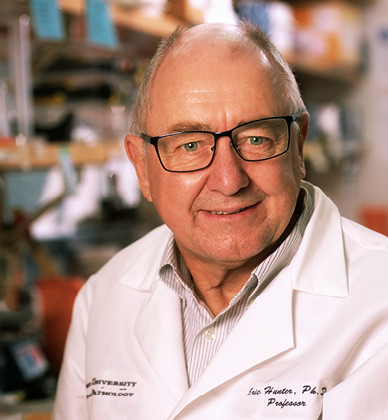Eric Hunter, Ph.D.
Retroviral Molecular Biology
Emory University
Recruited: 2004
Eric Hunter is world-renowned for having defined the molecular events that take place when a new host is infected with a retrovirus, the family of viruses that includes HIV.
Hunter has captured invaluable data by working with stable couples in Rwanda and Zambia. Among these couples, one person is infected with HIV and the other isn’t.
Hunter’s wife, Dr. Susan Allen, conducts complementary research that aims to prevent HIV transmission to the uninfected partner; however, in cases where the virus is passed on, Hunter can analyze how the immune system changes, how the viral cells replicate and mutate during early stages of infection, and how the newly infected person’s virus compares with that of his or her partner.
He has learned that many, rapidly mutating viruses live in an HIV-infected person; and that when the retrovirus is transmitted, the particular variant that infects the new host may or may not be the same variant that has replicated in the original host.
If scientists better understand how the viral cells establish themselves in a new host, they’re better equipped to target those early changes and behaviors, arresting the infection. As co-director of the Emory Center for AIDS Research and a member of the Emory Vaccine Center, Hunter hopes to someday create a vaccine to protect against infection, or at least keep the infection more manageable by preventing rapid replication
Research
Hunter’s research has primarily centered on elucidating the virus-cell interactions involved in the assembly and the entry of retroviruses. Understanding how independently targeted capsid and glycoprotein molecules are transported to the assembly site(s), what cellular pathways are utilized, and what roles cell- and virus-encoded gene products play in this process, are major areas of focus.
Because the major viral components traverse distinct pathways, Hunter's laboratory has characterized the factors that influence intracellular transport and assembly of both viral capsids and viral glycoproteins. He also has examined the signals and mechanisms that operate to include the viral glycoproteins into a budding virion and that mediate fusion.
Studies are underway to distinguish structural and functional differences between the glycosylated HIV envelope proteins that permit transmission into a new host, versus the majority of related HIV envelope variants in the donor that fail to lead to a transmission event. Additional studies are taking place – in collaboration with investigators at the University of Alabama at Birmingham (UAB) and in Perth, Australia – to examine how a newly transmitted virus adapts to its new host-defined immune environment so as to evade detection and destruction.
Choosing Georgia
Dr. Hunter was impressed by the foresighted support for higher education and innovative research that will form the basis for economic growth in the future; a willingness to provide a strong research infrastructure, through the GRA, that allowed the relocation of his research program; and a strong intellectual environment to foster academic growth.

